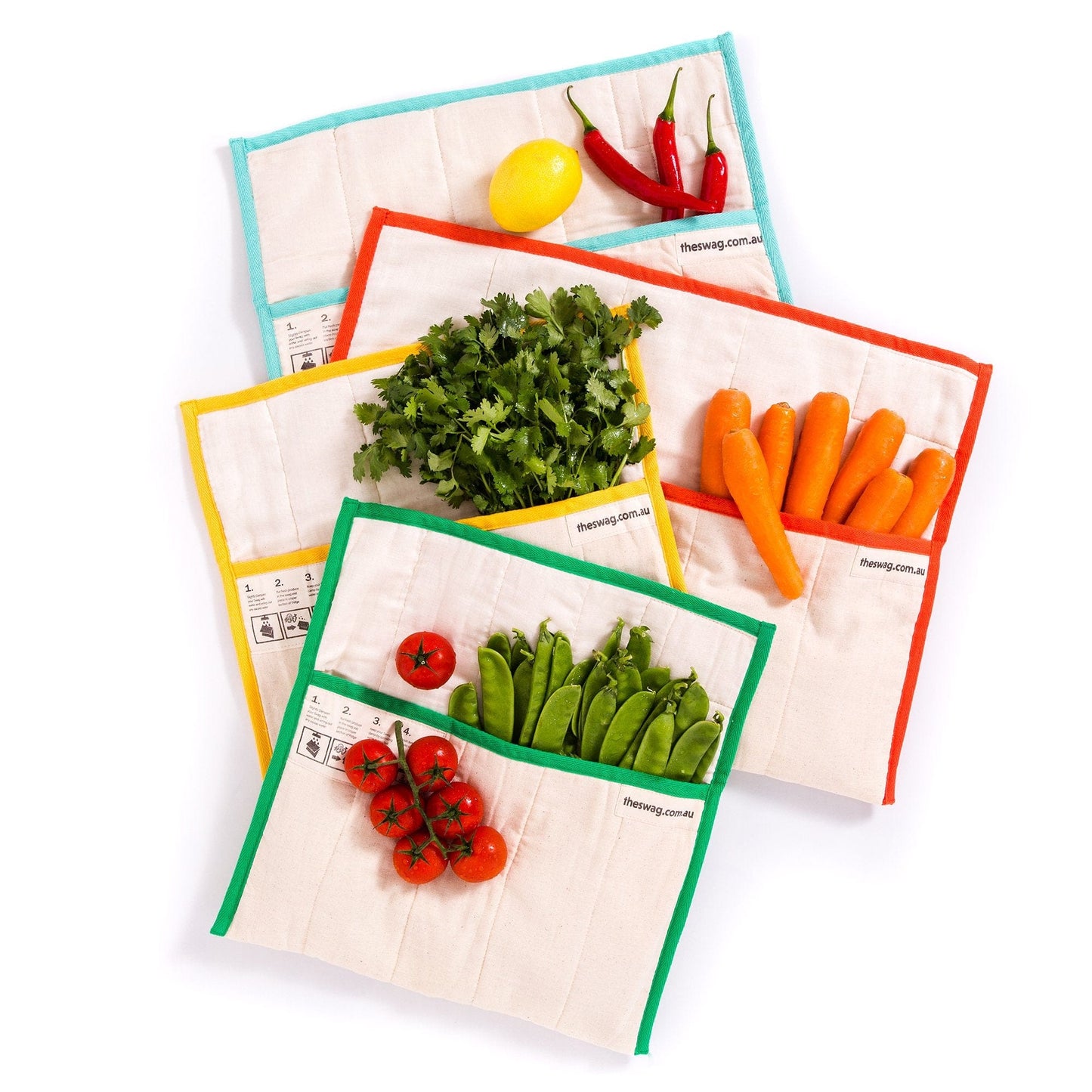With World Vegetarian Day being on October 1st, this month is the perfect time to consider adopting a more vegetarian or plant-based diet. Whether you're considering going fully vegetarian or simply want to reduce your meat consumption, embracing more plant-based meals can have a positive impact on your health, the environment, and your wallet. In this article we will explore those benefits plus give you some easy meat-free swap ideas, alongside 2 easy vegetarian recipes that all the family will love!
The Health Benefits of a Vegetarian Diet
1. Nutrient-Dense Meals with Essential Vitamins and Minerals
A vegetarian or plant-based diet is rich in whole foods like vegetables, fruits, legumes, nuts, seeds, and whole grains. These foods are packed with essential nutrients, such as fibre, vitamins (like vitamin C, folate, and vitamin A), and minerals (such as magnesium, potassium, and iron). Because these plant-based foods are lower in saturated fat and contain no cholesterol, they promote better overall health compared to diets that rely heavily on animal products.
2. Lower Cholesterol and Blood Pressure for Heart Health
One of the major benefits of adopting a plant-based diet is its ability to lower LDL cholesterol (commonly referred to as "bad" cholesterol) and reduce blood pressure. High levels of cholesterol and elevated blood pressure are key risk factors for cardiovascular disease, which is one of the leading causes of death worldwide. Studies have shown that people who follow a vegetarian diet tend to have lower rates of heart disease, as plant-based foods are rich in heart-healthy compounds like antioxidants, phytochemicals, and fibre. These elements help improve blood vessel function and lower inflammation, leading to better heart health over time.
3. Reduced Risk of Chronic Diseases
Adopting a vegetarian or plant-heavy diet can significantly reduce the risk of developing chronic diseases, including type 2 diabetes and certain types of cancer. Here’s how:
- Type 2 Diabetes: Plant-based diets are generally lower in refined sugars and processed foods, and higher in whole grains, legumes, and fibre. This results in better blood sugar control, reduced insulin resistance, and lower body fat, all of which contribute to preventing and managing diabetes.
- Cancer: Some studies suggest that plant-based diets may reduce the risk of developing certain types of cancer, especially colon, breast, and prostate cancers. This is attributed to the high levels of antioxidants, phytochemicals, and fibre found in plant-based foods, which help protect cells from damage and reduce inflammation.
4. Improved Digestion Thanks to Higher Fibre Intake
A vegetarian diet is naturally higher in dietary fibre, which is crucial for healthy digestion. Fibre helps regulate bowel movements, prevent constipation, and support the growth of healthy gut bacteria. A well-functioning digestive system not only enhances overall health but can also help prevent digestive disorders like irritable bowel syndrome (IBS), diverticulitis, and haemorrhoids. Additionally, a diet rich in fibre has been linked to lower rates of colon cancer and better absorption of nutrients.
5. Better Weight Management
Many people who adopt a vegetarian or plant-based diet find it easier to maintain a healthy weight or even lose weight. This is because plant-based meals tend to be more nutrient-dense but lower in calories than their meat-based counterparts. For example, a plate of lentils or chickpeas provides protein and fibre without the excess calories and saturated fats found in meats like beef or pork. Additionally, plant-based meals are often more filling due to their higher water and fibre content, making it easier to feel satisfied with fewer calories.
This makes vegetarian diets a great option for those looking to manage or reduce their weight, as well as lower their risk of developing obesity-related conditions like diabetes and heart disease.
The Environmental Benefits of Vegetarianism
Beyond the direct health benefits, reducing or eliminating meat consumption also has a significant positive impact on the environment. Livestock farming is a major contributor to greenhouse gas emissions, deforestation, and water use. By choosing plant-based foods over animal products, you are:
- Reducing your carbon footprint: Livestock, particularly cows, produce methane, a potent greenhouse gas. Shifting to a plant-based diet can reduce demand for animal products and lower emissions.
- Conserving water resources: It takes thousands of litres of water to produce just a kilogram of beef, whereas growing vegetables, grains, and legumes requires much less water. Reducing meat consumption can help conserve precious water resources.
- Minimising deforestation and habitat destruction: Forests are often cleared to create space for livestock grazing or to grow feed crops. Opting for more plant-based meals can help preserve natural ecosystems and protect wildlife habitats.
Easy Swaps to Reduce Meat Consumption
Transitioning to a more plant-based diet doesn’t have to be overwhelming. Here are a few easy swaps that you can make without sacrificing flavour:
- Swap mince for red kidney beans: Use kidney beans or other beans in your tacos, burritos, or chilli for a hearty, protein-packed alternative.
- Try lentil patties instead of beef burgers: Lentils provide a meaty texture, and they are perfect for making veggie burgers that are just as satisfying as the classic beef burger.
- Opt for chickpeas over chicken in your curries: Chickpeas hold their shape and absorb flavour beautifully in stews and curries.
- Substitute tofu for chicken in stir-fries: Tofu is a versatile protein that soaks up sauces and adds a chewy texture to your favourite Asian-inspired dishes.
- Go for mushroom steaks instead of beef steaks: Large portobello mushrooms have a rich, meaty texture and can be grilled or roasted for a satisfying meal.
Easy and Delicious Vegetarian Recipes for the Whole Family
1. Veggie-Packed Lentil Chilli Non Carne

This veggie chilli is a perfect, easy-to-make recipe for the whole family. Packed with protein and fibre, it’s a warm, comforting dish that even meat-eaters will love.
Ingredients:
- 1 cup red lentils, rinsed
- 1 can red kidney beans, drained
- 1 can diced tomatoes
- 1 onion, diced
- 2 cloves garlic, minced
- 1 red bell pepper, chopped
- 1 tbsp chilli powder
- 1 tsp cumin
- 1 tsp paprika
- Salt and pepper to taste
- 2 cups vegetable broth
- Optional toppings: avocado, cilantro, sour cream
Instructions:
- Heat a large pot over medium heat. Add the diced onion and garlic and sauté until soft.
- Add the bell pepper, chilli powder, cumin, and paprika. Cook for another minute.
- Stir in the lentils, kidney beans, diced tomatoes, and vegetable broth. Bring to a boil, then reduce heat and simmer for 25-30 minutes, or until the lentils are tender.
- Season with salt and pepper. Serve with your favourite toppings and enjoy!
2. Lentil and Sweet Potato Shepherd’s Pie

This Lentil and Sweet Potato Shepherd’s Pie is a hearty and wholesome dish that’s great for feeding a family. It’s packed with flavour and full of nutrients.
Ingredients:
- 2 large sweet potatoes, peeled and cubed
- 1 cup dried green lentils
- 1 onion, diced
- 2 carrots, chopped
- 1 celery stalk, chopped
- 2 cloves garlic, minced
- 1 tbsp tomato paste
- 1 tbsp soy sauce or tamari
- 2 cups vegetable broth
- 1 tsp thyme
- 1 tsp rosemary
- Salt and pepper to taste
Instructions:
- Boil the sweet potatoes until soft, then mash with a pinch of salt and pepper. Set aside.
- In a large pan, sauté the onion, garlic, carrot, and celery until softened.
- Add the lentils, tomato paste, soy sauce, thyme, and rosemary. Stir well to combine.
- Pour in the vegetable broth and simmer for 20-25 minutes until the lentils are tender.
- Preheat your oven to 200°C (390°F). Transfer the lentil mixture to a baking dish and spread the mashed sweet potatoes on top.
- Bake for 20 minutes, until the sweet potato topping is golden and crispy.



